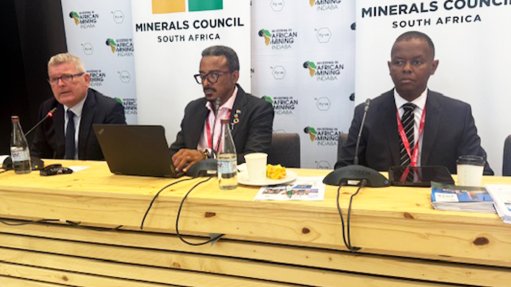Noisy diplomacy
Phophi Ramathuba may not have been a household name beyond Limpopo province, where she is the MEC for Health, until last month, but this is not the case anymore, after a video clip in which she is seen haranguing an immigrant patient in a public hospital ward went viral on Twitter.
The gist of what Ramathuba said to the female patient, who hails from Zimbabwe and was presumably in South Africa in contravention of immigration laws, is that she and her compatriots are one of the reasons the health system in the province is burdened to near breaking point. Consequently, Zimbabwean President Emmerson Mnangagwa should foot the bill for their treatment in South African public health facilities, she fumed.
Public reaction to her outburst was swift, with some, including medical ethics experts, lambasting her, saying her behaviour was at odds with the oath she took as a medical practitioner, while others sprang to her defence, pointing to the number of Zimbabwean citizens who seek medical care in Limpopo, which they say has increased to an avalanche over the years.
In subsequent media interviews and Twitter Spaces discussions, Ramathuba stuck to her guns, saying, for instance, that Zimbabwean women admitted in the maternity ward at Musina hospital were found to outnumber South Africans at some point.
The matter found its way to Parliament last month, during a question-and-answer session with President Cyril Ramaphosa, who essentially said it was worthwhile discussing the issues Ramathuba had raised – even with the Zimbabweans – although he conceded that she could have brought the issues up in a more appropriate way.
Am I correct in sensing a shift in the manner in which the South African government conducts its diplomatic relations with Zimbabwe – from the quiet diplomacy of the Thabo Mbeki era to a noisier engagement that plays out in traditional media such as newspapers and television as well as on Twitter Spaces?
That Ramathuba has not been publicly censured and that Ramaphosa, in his response in Parliament, appeared to approve of the content – but not the manner of delivery – of what the MEC had said seems to suggest that the days when Mbeki would tell the world that “there is no crisis in Zimbabwe”, when opposition party supporters were being terrorised in the aftermath of the 2008 elections, are gone for ever.
I must say South Africa’s diplomatic decibels appear to have been increasing for some time. For instance, at the height of prodemocracy protests in eSwatini in 2021, the ruling African National Congress’s spokesperson lashed out in a media release: “We call on the government of eSwatini to heed this urgent call by moving away from autocracy, strong-handed crisis management and brutal repression of legitimate civilian concerns.”
If a shift is indeed under way, South Africa should go the full hog. I was disappointed when, during a Twitter Spaces discussion on September 1, Ramathuba repeated the Zimbabwean ruling party’s lie that the country’s woes stem from Western economic sanctions. These are targeted measures aimed at inducing ruling party politicians to uphold democratic and human rights norms. I’m sure Ramathuba knows this.
Not calling out the Harare regime for its depredations means the conditions in Zimbabwe will continue to be dire, and South Africa will continue to feel the impact. Owing to the collapse of the healthcare system in Zimbabwe, for example, 2 500 women reportedly die during childbirth each year. As they say, humans are self-preserving by nature. So, it’s not difficult to understand that pregnant Zimbabwean women who cannot afford private healthcare in their own country will be tempted to cross into South Africa near the time of delivery instead of checking into local facilities, where the odds of dying are higher.
Article Enquiry
Email Article
Save Article
Feedback
To advertise email advertising@creamermedia.co.za or click here
Comments
Press Office
Announcements
What's On
Subscribe to improve your user experience...
Option 1 (equivalent of R125 a month):
Receive a weekly copy of Creamer Media's Engineering News & Mining Weekly magazine
(print copy for those in South Africa and e-magazine for those outside of South Africa)
Receive daily email newsletters
Access to full search results
Access archive of magazine back copies
Access to Projects in Progress
Access to ONE Research Report of your choice in PDF format
Option 2 (equivalent of R375 a month):
All benefits from Option 1
PLUS
Access to Creamer Media's Research Channel Africa for ALL Research Reports, in PDF format, on various industrial and mining sectors
including Electricity; Water; Energy Transition; Hydrogen; Roads, Rail and Ports; Coal; Gold; Platinum; Battery Metals; etc.
Already a subscriber?
Forgotten your password?
Receive weekly copy of Creamer Media's Engineering News & Mining Weekly magazine (print copy for those in South Africa and e-magazine for those outside of South Africa)
➕
Recieve daily email newsletters
➕
Access to full search results
➕
Access archive of magazine back copies
➕
Access to Projects in Progress
➕
Access to ONE Research Report of your choice in PDF format
RESEARCH CHANNEL AFRICA
R4500 (equivalent of R375 a month)
SUBSCRIBEAll benefits from Option 1
➕
Access to Creamer Media's Research Channel Africa for ALL Research Reports on various industrial and mining sectors, in PDF format, including on:
Electricity
➕
Water
➕
Energy Transition
➕
Hydrogen
➕
Roads, Rail and Ports
➕
Coal
➕
Gold
➕
Platinum
➕
Battery Metals
➕
etc.
Receive all benefits from Option 1 or Option 2 delivered to numerous people at your company
➕
Multiple User names and Passwords for simultaneous log-ins
➕
Intranet integration access to all in your organisation


















